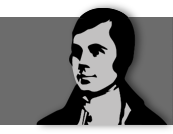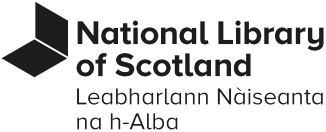The Cowie Collection manuscripts
A collection comprising manuscripts of Robert Burns, Sir Walter Scott and Allan Ramsay made by Charles R Cowie of Glasgow and presented to the National Library of Scotland in 1964 and 1966.
Of particular interest in this collection are MS 15952, fragments of Burns's autobiographical letter to Dr John Moore (transcribed in its entirety in one of the Glenriddell Manuscripts, MS 86) and MS 15953, a volume of letters, engravings and drawings relating to Burns, 1788-1889 and some undated, (with a related index to its contents catalogued as MS 15954).
Another aspect of the collection worthy of note is MSS 15955-67, a series of 13 manuscripts based on the seven-volume collection 'The works of Robert Burns', edited by W Scott Douglas, (Edinburgh, 1877-1879). There are a number of poems and letters in the poet's hand placed throughout these volumes, together with letters of his brother Gilbert about the family (1796-1809) and correspondence of James Currie about an edition of the poems.
MS 15952 contains fragments of the poet's famous autobiographical letter, written at Mauchline in August 1787, addressed to Dr John Moore. This fragmented copy of the major source for the poet's early life is Burns's original draft; the actual copy sent to Dr Moore is in the British Library (pressmark: Egerton MS 1660).
John Moore (1729-1802), who was born in Stirling and educated at Glasgow Grammar School and at the University of Glasgow, where he studied medicine, became acquainted with Burns through Mrs Frances Dunlop. Moore and Burns corresponded for a number of years; this exchange of letters included another — later — autobiographical letter of Burns, dated 4 January 1789, in which he updated his life's events. The earlier letter — being considered here — is full of revealing hints and expressions of self-knowledge and worth:
'My name has made a small noise in the country … I have not the most distant pretensions to what the pye-coated guardians of escutcheons call A Gentleman … I was born a very poor man's son … I made an excellent English scholar … In my infant and boyish days too, I owed much to an old Maid of my Mother's [who] had, I suppose, the largest collection in the county of tales and songs concerning devils, ghosts … witches [i.e. Betty Davidson who is attributed with implanting in the child's mind the stuff which resulted in his master-piece 'Tam o' Shanter'] … This cultivated the latent seeds of Poesy … while the story of Wallace poured a Scottish prejudice in my veins which will boil along there till the flood-gates of life shut in eternal rest … this kind of life [farm work], the chearless gloom of a hermit with the unceasing toil of a galley-slave, brought me to my sixteenth year; a little before which period I first committed the sin of RYHME … thus with me began Love and Poesy … the great misfortune of my life was, never to have AN AIM …
'I spent my seventeenth summer [in Kirkoswald, south Ayrshire, where] I made greater progress in the knowledge of mankind … and I was no enemy to social life … a charming Fillette who lived next door to the school … set me off in a tangent from the sphere of my studies … [he then relates the various literary and social influences which marked his life in his early-mid 20s before touching upon the publication of the Kilmarnock edition] … I threw off six hundred copies, of which I had got subscriptions for about three hundred and fifty. — My vanity was highly gratified by the reception I met with from the Publick [as a result of the encouragement of Dr Thomas Blacklock (1721-1791) on the success of the Kilmarnock edition] away I posted to Edinburgh without a single acquaintance in town, or a single letter of introduction in my pocket [where] the providential care of a good God placed me under the patronage of … the Earl of Glencairn …'
The fragmented — but repaired — nature of this draft clearly diminishes its value and importance as one of the 'icons' of the National Library of Scotland's collection of manuscripts. Its significance — in terms of Burns's realisation (at the age of 28) of his current and future worth and reputation — is in the undoubted fact of its being a first-hand record of what the poet perceived himself to be.
MS 15953 is an artificially gathered but handsome volume comprising some 73 letters, manuscripts drawings and engravings of, and relating to, the poet. It includes one autograph letter of Burns to Captain Richard Brown, 20 March 1788; a few words — in the poet's hand — of a glossary of Scottish words; a series of 13 accounts of purchases made by Burns from 1788 to 1792. There are, moreover, various significant letters of members of the poet's family, friends, circle, and those involved in establishing his reputation. The writers include: Alexander Fraser Tytler of Woodhouselee; Gilbert Burns, brother of Robert, Robert Burns and James Glencairn Burns, sons of the poet; letters of Sir Walter Scott, concerning the monument to Burns in Edinburgh; and Allan Cunningham. There are considerable runs of letters of George Thomson relating to his work on Scottish songs and of Robert Wallace, descendant of Sir William, concerning Burns's poem 'Scots wha hae wi' Wallace bled', and the volume concludes with a facsimile of that poem. There are various engravings of the poet and a series of 10 watercolour-and-wash drawings by David Allan illustrating some of Burns's poems; beside each illustration is the verse which it illustrates. The volume also includes a set of engravings of proofs illustrating some of Burns's poems, including 'Tam o' Shanter' and 'The Cotter's Saturday night'.

